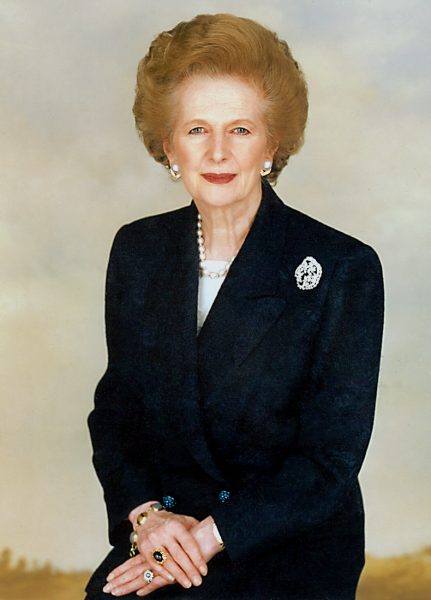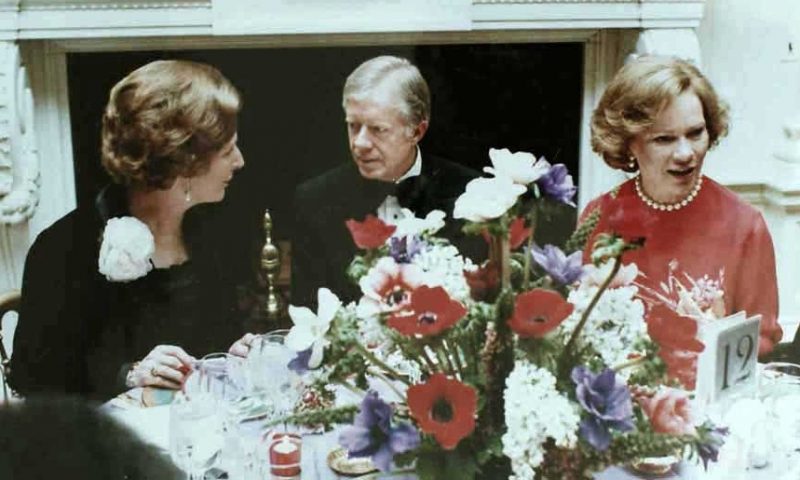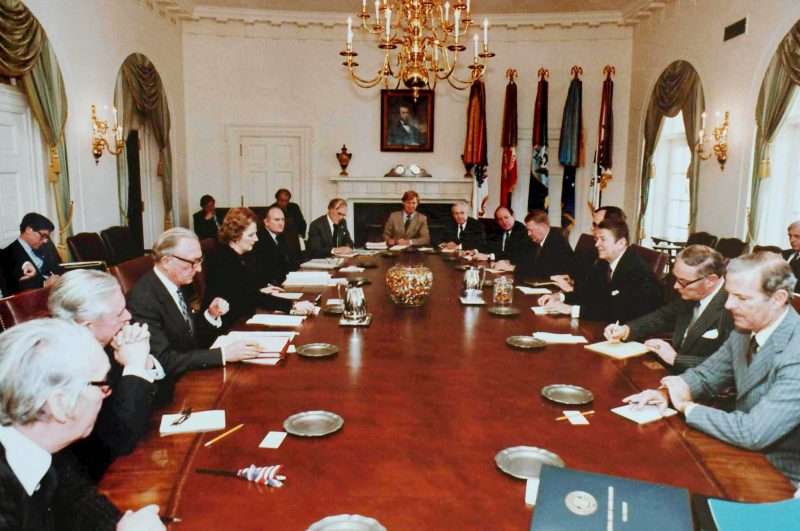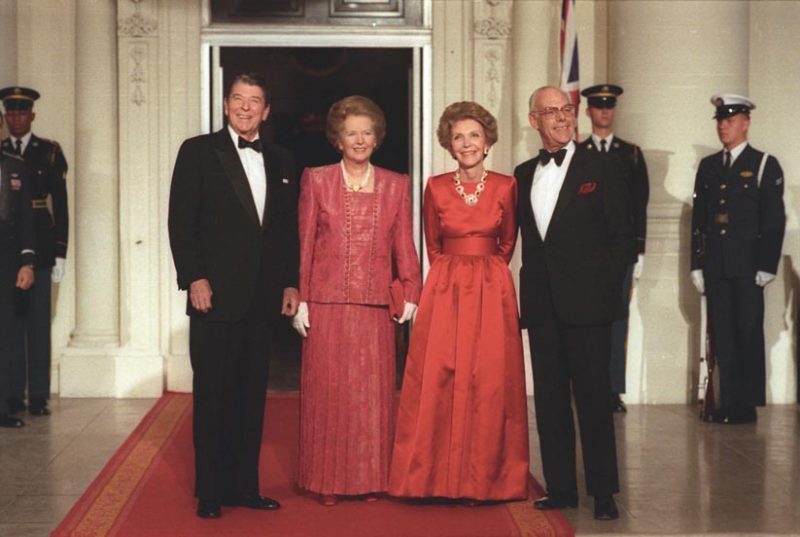Margaret Thatcher
Ruud Hawinkels
In this series of sTAUt the famously dispute Prime Minister of the United Kingdom, Baroness Margaret Thatcher. Leader of the UK for eleven years. Her decisive manner of talking earned her the nickname The Iron Lady, while the current British goverment is until today’s date undecided whether to grant her the rare honour of a state funeral.
 Oxford
Oxford
Lady Thatcher, her formal name is The Right Honourable The Baroness Thatcher, LG, OM, PC, was born in a the town of Grantham in Lincolnshire. Her father owned two grocery stores and was an active member of the local society. Being an Alderman in local politics for several years as well as a lay preacher for Methodist church.
The little Margaret was known for her hard work and commitment to every thing she did. After finishing high school during the Second World War, she attended Somerville college, a constituent girls college of the University of Oxford. She specialised in Chemistry, but her interest in politics was already aroused. She joined the Oxford University Conservatives Association (OUCA) and became president of this Association during her third year. In 1947 she received a post graduate Bsc degree in crystallography and started working as a research scientist at a polymer manufacturer. Obviously she stayed connected to the Conservative Party. In 1949 she was asked to be the Conservative candidate for Dartford in the 1950 elections for parliament. This was the beginning of a moving period.
Beginning of a long career
She lost the 1950 election with a minor difference, but her campaign as the youngest ever female Conservative candidate attracted lots of attention. She was rejected several times during the following elections, but eventually she won a seat during the 1959 elections after a hard campaign. In the mean time she met her husband Denis Thatcher, gave birth to a twin, Carol and Mark, and finished a study for barrister.
As a Member of Parliament (MP) for the Conservatives she made quick promotion as a spokesman for several secretaries, establishing herself as a potent speaker with strong rhetorics. Her policies where mostly popular in the Conservative party, although she voted as one of few Conservatives for decriminalisation of male homosexuality and abortion.
 In the 1970 elections the Conservatives won the general vote and Thathers was assigned the post of Secretary of Education and Sciences under Edward Heath, also a former president of the OUCA. The Conservatives decided that they should cut spendings to help the struggling British economy. Lady Thatcher was reluctant to cut spendings on academic needs so she figured that few children would suffer if she charged for milk at primary schools. This decision provoked a storm of protest.
In the 1970 elections the Conservatives won the general vote and Thathers was assigned the post of Secretary of Education and Sciences under Edward Heath, also a former president of the OUCA. The Conservatives decided that they should cut spendings to help the struggling British economy. Lady Thatcher was reluctant to cut spendings on academic needs so she figured that few children would suffer if she charged for milk at primary schools. This decision provoked a storm of protest.
The Heath government experienced many difficulties, because of a wavering economic policy. They lost the 1974 elections to the Labour party which spiralled the Party in an even steaper descent. Thather grasped the moment and challenged Heath for the parties leadership. She promissed a fresh start for the party. Backed by the parties lower Members of Parliament she unexpectedly defeated Heath in the first round. Heath stepped back, while Heath’s preferred successor Whitelaw, was no match for Thatcher in the second round. Thatcher became party leader and appointed Whitelaw as her deputy. From 1975 to 1979 Thatcher was the Leader of the Opposition, attacking the Labour party for their unemployment record and failing foreign policy. In 1979 a motion of no confidence brought Callaghan’s Labour government down. The Conservatives would win the elections with a 44-seat majority and Thatcher became UK first female Prime Minister.
Prime Minister
Thatcher was committed to reverse the UK’s decline from the days of Empire. She wanted a new self esteem for the United Kingdom, this should be accomplished through a higher level of influence in international affairs and a greater independence of the individual from the state.
She advocated reduced state intervention and free markets. This would mean a major change for the British industries which where largely state-owned.
Her first economic reforms where so drastic that the deepened the economic crisis even further, while unemployment soared. This resulted in the lowest every approval rating for a Prime Minister. Only a quartre of the country thought Thatcher was going in the right direction. At the start of her second year in office the economy started to recover, although unemployment remained high.
The Falkland war brought a new challenge to uplift the British emperial feelings. The day after Argentina invaded the Falklands, Thatcher send a naval task force recaptured the British overseas territories. Argentina surrendered after two and half months. The victory brought a wave of patriotism and support for the government over de UK. Thatcher’s approval rate rocketed from 30% to 59%, while the Labour party dropped to a minor 27%.
It is still disputed whether the Falkland war was a factor during the 1983 elections. Thatcher’s popularity had risen considerably during the war, but also the long-time economic effects of her policy began to show.
 A largely divided Labour party could not stand up against Thatcher’s unwavering character and she won the 1983 election with a massive majority of 144 MP’s
A largely divided Labour party could not stand up against Thatcher’s unwavering character and she won the 1983 election with a massive majority of 144 MP’s
During her second term in office, from 1983 to 1987, she continued her policy of free markets and reduced state intervention, with a major privatisation of large state utilities. Almost all state owned companies where privatised. This again led to a large amount of jobs lost, since privatisation was meant to lead to higher labour productivity, although this effect is dispute. The productivity increase under Thatcher is largely atributed to decreasing of the workforce, hence more unemployment, instead of harder workers.
Together with the privatisation Thatcher reduced regulation on the financial markets in an attempt to boost economy. This encouraged the growth of the financial and service sector in the UK to replace the manufacturing industry.
This financial growth model of speculation and trade in financial claims is linked by many critics of Thatcher to the recent financial crisis, because the lack of control and regulation made it possible for the financial sector to grow out of proportion. Other more neutral source state that there have been to many intervening years to link the recent crisis to Thatcher’s financial policies.
In 1987 Thatcher was up against a still devided Labour party and won the general elections again with a massive majority this time of 102 MP’s. She was the first 20the centrury Prime Minister that served a third term and became the longest serving Prime Minister since Lord Liverpool (1812 to 1827).
The economy was thriving and Thatcher’s policy was almost completely implemented although there was one issue which she needed to address. She wanted to reform the way governmental revenues where acquired and redistributed. She wanted more influence of local governments. This resulted in rising taxes for citizens. Thatcher’s popularity declined within the government and the community due to her refusal to compromise on the subject. Unrests mounted and even small riots took place.
Her perfomances in the European Commity where splitting her party and eventually the whole government. She refused to let Europe take over governmental influence over the Britons which she struggled so hard to get rid of.
Her refusal to set a timetable for the British to join a common European currency, proved to be one bridge to far. Geoffrey Howe, for 15 years long one of Thatcher’s loyal supporters, resigned his position as Deputy Prime Minister. A few days later she was challenged for the Conservatives leadership and while she survived an earlier challenge, this time she lost the first round and resigned from office on the 22nd of november.
 Aftermath
Aftermath
While she was the longest serving Prime Minister of the 20th century and served an unprescedented three terms, she has the second lowest overall approval rate ever recorded. It is not to be expected that a Prime Minister that singledhanded transformed the British economy from a manufacturing economy to a financial and service economy is popular on the short term. Thatcher never regretted any of her dicisions and has, until recent health problems obstructed her, been an influence on British political issues.
In recent years Lady Thatcher’s failing health, she has suffered a series of small stroke and suffers from memory loss, should have awoken the current Prime Minister Brown that he needs to be as decisive as The Iron Lady herself on a certain state issue.
 Eindhoven
Eindhoven Hemelrijken 131
Hemelrijken 131
